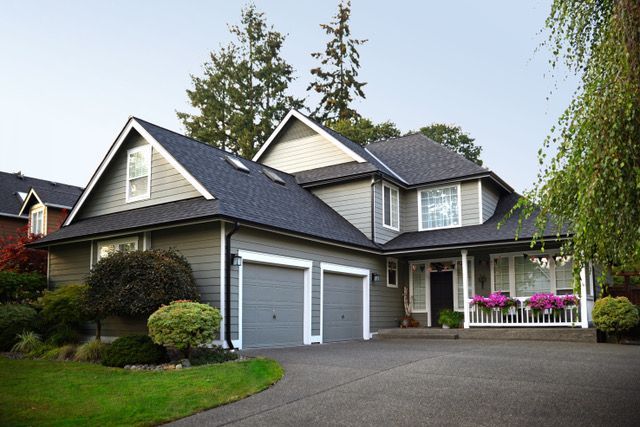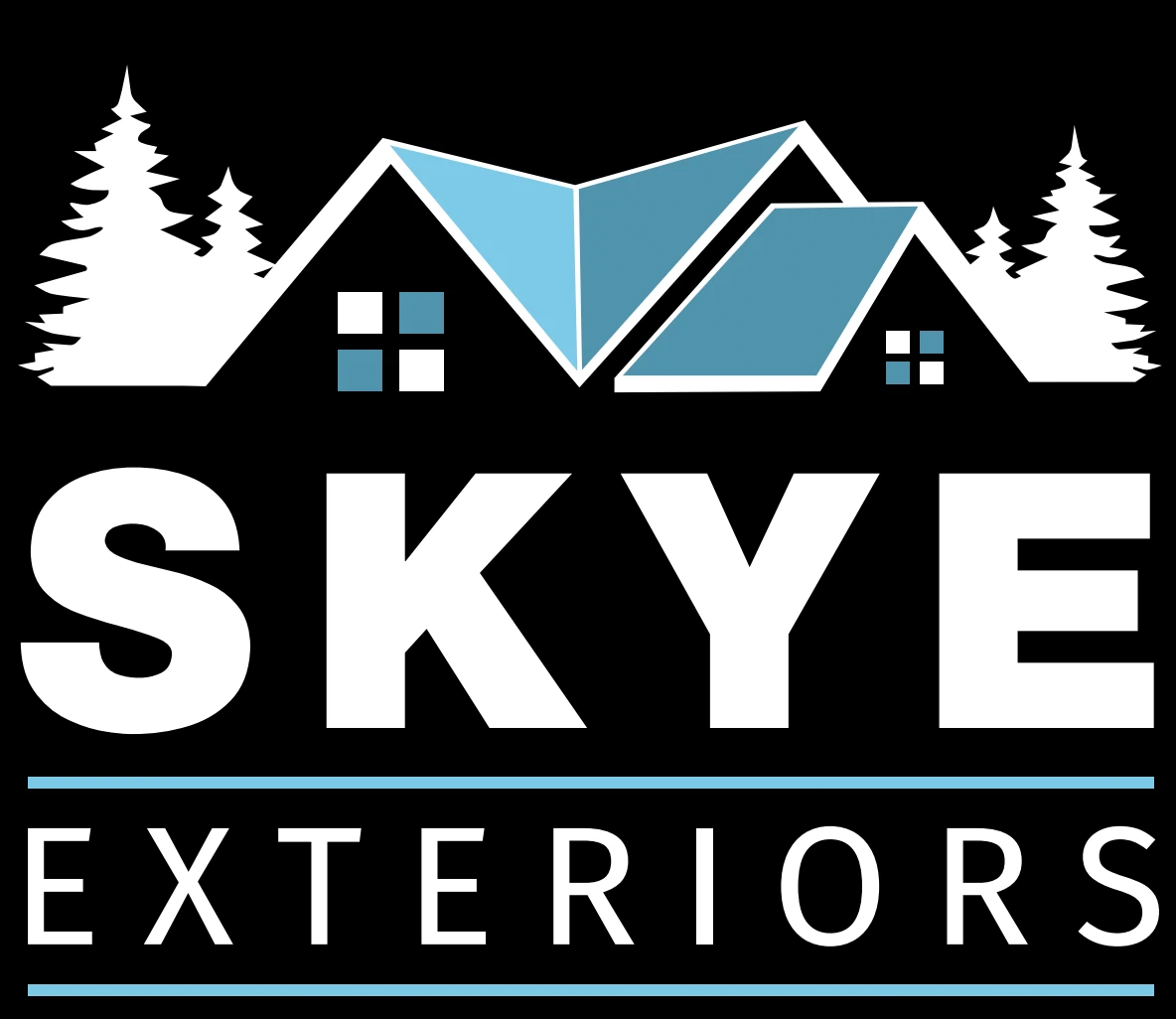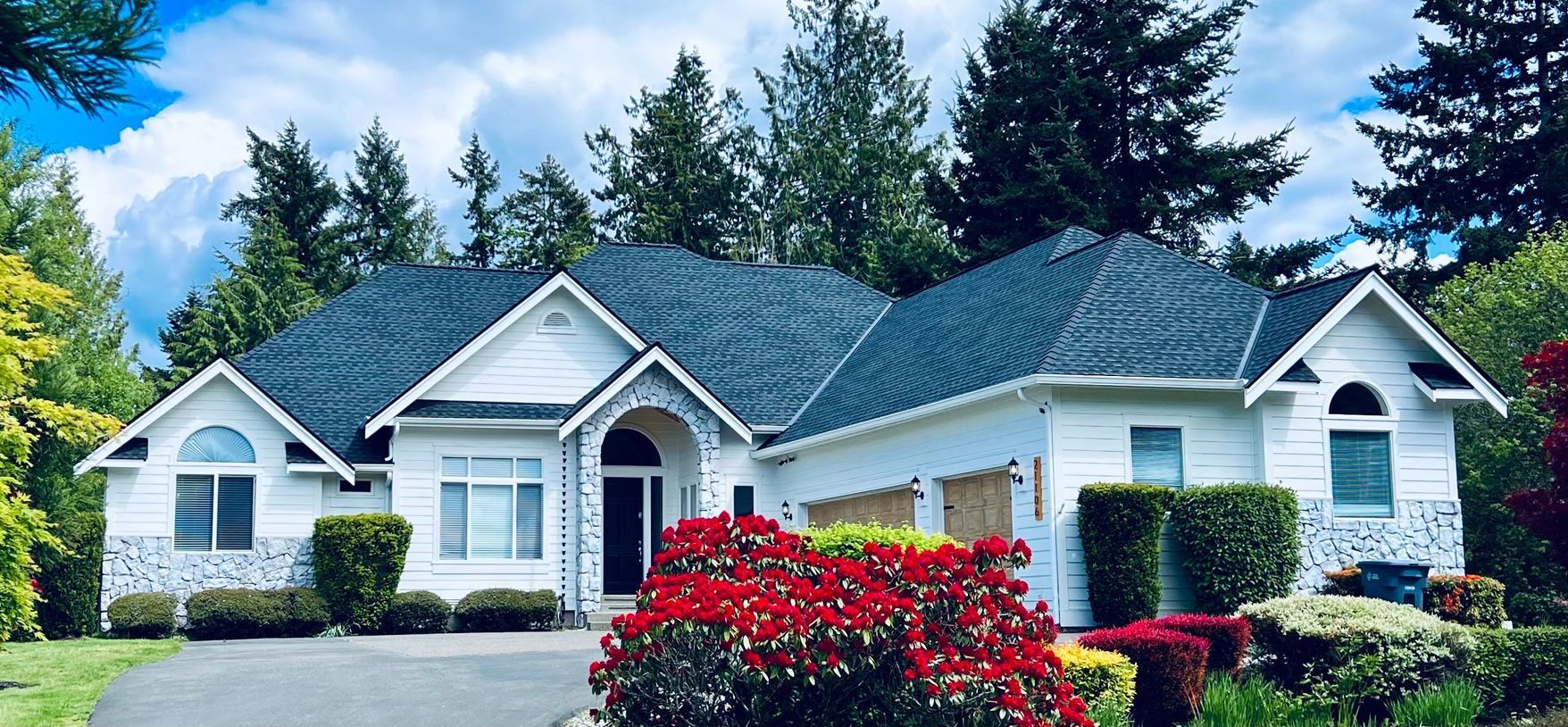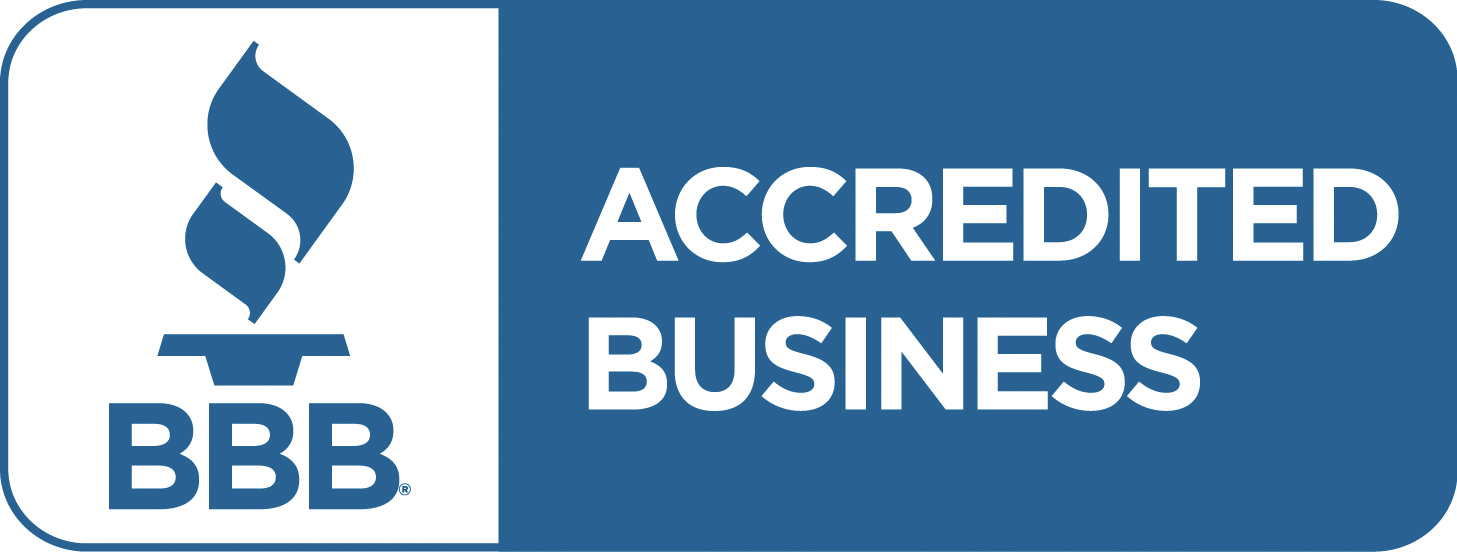Quality, Professional Residential Roof Installation

Roof Installation
Skye Exteriors offers reliable and professional residential roof repair services to homeowners who must address roof issues. Whether it's a leak, damage from storms, or general wear and tear, our team of experts are dedicated to providing high-quality solutions to keep your home safe and protected. At Skye Exteriors we take pride in attention to detail and use of top-quality materials to ensure that every repair job is done right the first time. We are committed to delivering exceptional customer service and making the repair process as stress-free as possible for our clients.
Skye Exteriors prides itself on its attention to detail and excellent customer service, ensuring that every homeowner is completely satisfied with the final result.
Roof Installation: A Complete Guide to Installing a New Roof
Installing a new roof isn't simply slapping on some shingles. It's a detailed, step-by-step process that involves carefully planning and selecting the right materials. From understanding the different types of roofs to estimating costs, the journey doesn't just end after your final tile is put in place. Surprisingly, a successful installation also depends on small tips and tricks that ensure a smooth and long-lasting finish - something not everyone talks about. And it all kicks off with choosing the right materials for your specific needs.
Professional roof installation ensures proper sealing, efficient drainage, and long-term durability, ultimately enhancing the structural integrity and longevity of your property. Additionally, it can improve energy efficiency and increase the value of your home or business.
Roof Installation: An Overview
Installing a new roof is like giving your home a fresh coat of armor, providing a protective layer that shields it from various weather conditions. However, there's more to it than just slapping some shingles on top. Let's closely examine what goes into the process of roof installation.
First, choosing the right material for your roof is crucial. From classic asphalt shingles to durable metal or stylish clay tiles, each material has its own pros and cons, influencing the appearance, longevity, and cost of your roof. For example, asphalt shingles are popular due to their affordability and wide variety of styles and colors, while metal roofs have better durability and longer lifespan, making them a sustainable choice despite being pricier upfront.
The next step involves estimating the cost based on the selected materials and other project requirements. Factors such as the size of your roof, any structural repairs needed beforehand, and the type of material chosen will play a major role in determining the overall cost. It's essential to get an accurate estimate to plan your budget effectively and avoid surprises down the road.
Understanding different types of roofs also comes into play - pitched roofs, flat roofs, and their subtypes such as gable roofs, hip roofs, shed roofs, and so on. Each type has its own unique characteristics and benefits, so it's important to consider what works best for your specific property based on factors like climate, architectural style, and personal preferences.
For instance, if you live in an area that experiences heavy rain or snowfall, a steeply pitched roof might be ideal to allow for efficient water runoff. On the other hand, if you're looking to maximize interior space or create a modern aesthetic, a flat or low-slope roof could be more suitable.
Project planning is equally important in ensuring a successful roof installation process. From designing a timeline to arranging for the delivery of materials and coordinating with roofing professionals, every detail needs careful consideration before beginning the actual work. This lays the foundation for a seamless execution that minimizes disruptions during the installation process.
With a thorough understanding of the initial stages involved in roof installation, it's time to delve into one of the most critical aspects—choosing the right materials and shingles for your roof.
Choosing the Right Materials and Shingles for Your Roof
Selecting the materials and shingles for your new roof is a pivotal decision that directly impacts the long-term performance, aesthetic appeal, and overall value of your home. It's not just about sticking to a budget or following trends; it's about making informed choices that align with the specific needs and characteristics of your property. Let's explore key factors to consider when choosing materials and shingles for your roof.
First and foremost, durability should be a top priority when considering roofing materials. Opt for materials like asphalt shingles, metal, clay tiles, or slate that are known for their resilience, longevity, and ability to withstand local climate conditions. For instance, if you live in an area with frequent heavy rainfall or intense sunlight, you'll want materials that hold up well against these elements. Investing in durable materials ensures that your roof will be well-equipped to handle the challenges it may face over the years.
In addition to durability, it's also crucial to evaluate the aesthetic appeal of the materials and shingles you choose. When assessing aesthetic appeal, consider shingles that complement the architectural style and color scheme of your home. The goal is to enhance not just the functionality of your roof but also its visual impact on the overall curb appeal and property value. By selecting shingles that harmonize with the existing style and design of your home, you create a cohesive and attractive appearance that enhances its overall visual appeal.
For instance, if you have a traditional colonial-style home, opting for classic asphalt shingles in neutral tones can maintain the timeless elegance of the property. On the other hand, if your home boasts a modern architectural design, sleek metal or slate materials in contemporary colors can provide a striking visual contrast. By evaluating how different options tie into the existing aesthetic of your home, you can make a choice that upgrades both its protection and appearance.
In summary, prioritizing durability and aesthetic compatibility when selecting roofing materials ensures that your investment not only stands up to environmental pressures but also adds a touch of elegance to your property. By carefully considering these aspects, you're laying the foundation for a strong, resilient, and visually appealing roof that contributes significantly to your overall satisfaction as a homeowner.
Now that we've explored the considerations for choosing the right materials and shingles for your roof, let's investigate the financial aspects involved in roof installation.
The True Cost of Roof Installation
Installing a new roof is a significant investment in your property. It's important to grasp the various factors that influence the overall cost, ensuring that you have a clear understanding of what to expect. Let's take a look at some key considerations that affect the costs of roof installation.
Factors Affecting Costs
The expense associated with installing a new roof is not one-size-fits-all. Several crucial elements come into play when determining the final price tag. These include:
- Roof Size: The size of your roof directly impacts the amount of material and labor required for installation.
- Material Quality: Different roofing materials vary widely in cost. High-quality materials may come with a higher upfront cost but offer better durability and longevity.
- Labor: The expertise and skill of the roofing team you hire will contribute to the overall cost.
- Permits: Depending on local building codes, permits may be required for certain types of roofing installations, which can add to the overall cost.
- Structural Repairs: In some cases, structural repairs may need to be addressed before the new roof can be installed, adding to the total expense.
It’s important to note that these factors can significantly impact the cost range for your specific project, and obtaining personalized quotes from reputable contractors is vital.
Average Costs
Industry data suggests that the average cost of roof installation in the US falls within a range of $5,353 to $10,686. For most homeowners, particularly those opting for asphalt shingle installations on a 1,500 square foot roof, the typical expenditure hovers around $8,143.
This data provides a helpful reference point but remember that costs can fluctuate based on location, material selection, and specific project requirements.
Remember, while it’s natural to consider costs as a primary concern, it’s equally essential to focus on long-term value and quality. Investing in a well-installed and durable roofing system can offer benefits for many years to come – safeguarding your home and family while enhancing property value.
Understanding the financial aspect of roof installation helps in making informed decisions. Now let's explore the different options available when it comes to choosing the right type of roof for your property.
Types of Roofs: Understanding Your Options
When it comes to choosing the right type of roof for your home, one size certainly does not fit all. Each roofing material has its own unique characteristics, benefits, and drawbacks. Let's explore some common options:
Asphalt Shingles
Asphalt shingles are a popular choice for many homeowners due to their affordable price, versatile design options, and relatively easy installation. They come in a variety of colors and styles, making them suitable for a wide range of architectural designs. However, it's important to note that they may not be as durable as other materials and may require more frequent replacement over time.
Quick Tip: When selecting asphalt shingles, consider the climate in your area and the lifespan you expect from your roof. Some high-quality asphalt shingles can last up to 30 years when properly maintained.
Metal Roofs
Metal roofs have gained popularity due to their exceptional durability, energy efficiency, and resistance to fire. They are particularly ideal for areas prone to extreme weather conditions such as heavy snowfall or strong winds. While the initial cost may be higher than some other materials, metal roofs often last significantly longer, making them a cost-effective choice in the long run.
Statistics: According to industry experts, metal roofs can last 40-70 years or more with proper maintenance, far exceeding the lifespan of many other roofing materials.
Slate and Tile Roofs
Slate and tile roofs are known for their timeless elegance, durability, and fire-resistant properties. They offer a sophisticated and upscale appearance that enhances the curb appeal of any home. However, it's essential to consider the weight of these materials as they are typically heavier than asphalt or metal roofs. Professional installation is often required to ensure structural integrity and safety.
Comparison: While they may be more expensive and require specialized installation, slate and tile roofs can last well over 100 years when cared for properly, making them a wise long-term investment.
Wood Shingle Roofs
Wood shingle roofs provide a natural and eco-friendly aesthetic that appeals to many homeowners seeking a rustic charm. However, it's important to note that wood shingles may require more maintenance compared to other materials. Regular upkeep is necessary to prevent issues such as mold, mildew, and insect damage. Additionally, they may not be as fire-resistant as some other options.
Now that we've explored the various types of roofs available for installation, it's time to shift our focus towards preparing for the actual process of roof installation.
Project Planning: Prepping for Roof Installation
Installing a new roof is a significant undertaking that demands careful planning and execution. The first step in this process is obtaining the necessary permits. This is crucial because local building codes dictate specific requirements for roofs to ensure safety and adherence to regulations.
These permits are vital as they serve as official approval from the local authorities, confirming that your plans comply with their regulations. In some cases, a contractor may be able to obtain these permits on your behalf, but it's essential to clarify responsibilities with your chosen roofing professional to avoid any miscommunication regarding this crucial aspect of the project.
With permits secured, it's now time to prepare the work area.
Clearing and Securing the Work Area
The next step in prepping for roof installation is clearing the work area. This involves removing any obstacles around the property to provide clear and safe access for the roofing crew. Additionally, clearing the work area helps protect nearby landscaping during installation. Your outdoor furniture, decorations, and any other items around your home should be relocated or protected to minimize the risk of damage during the construction process.
It's also important to trim back any overhanging tree branches that could interfere with the installation process or pose a hazard. By taking these steps, you'll facilitate a smoother workflow for the roofing crew and reduce the risk of accidents or damage to your property.
By obtaining permits and clearing the work area, you're setting yourself up for a successful roof installation project. Now let's move on to further planning considerations before starting the actual installation.
As we continue our journey towards a successfully completed roof installation project, we'll explore additional essential preparations and strategies that contribute to a seamless process in the next section.
Proven Tips for a Successful Roof Installation
When it comes to installing a new roof, a few key tips can make all the difference. It's not just about the materials and labor; it's also about the decisions you make along the way. Let's explore some essential points that can help guide you through the process.
Seek Professional Advice
Seeking advice from reputable roofing contractors before diving into a new roof installation project is crucial. These professionals have valuable expertise in material selection, project planning, and installation best practices. Their guidance and recommendations can help you make informed decisions and avoid potential issues later on.
Credible roofing contractors can offer insights into the best material options based on your specific needs and budget constraints. They can also provide valuable input on the most suitable roofing solutions for your property, whether it's residential or commercial. By consulting with experts, you can gain a deeper understanding of how to proceed with the installation process in a way that maximizes quality and longevity.
Regular Maintenance
Once your new roof is installed, it's not time to rest on your laurels. Regular maintenance is vital for ensuring the longevity and performance of your new roof. Scheduling periodic inspections and maintenance checks is crucial to identify any potential issues early on and address them promptly.
Consider setting up a preventive maintenance plan with your roofing contractor. This involves scheduling routine inspections to check for leaks, inspect flashing, clear debris, and ensure that everything is in optimal condition. By staying proactive with maintenance, you can extend the lifespan of your new roof and prevent potential issues from escalating.
Another aspect of regular maintenance involves paying attention to any signs of damage or wear and tear after extreme weather events. After heavy storms or high winds, it's important to conduct a visual inspection of your roof to look for any damage that may have occurred. Addressing these issues promptly can prevent them from developing into more significant problems over time.
With these tips in mind, you can navigate the roof installation process with more confidence, knowing that you've sought expert advice and have a plan in place to maintain the integrity of your new roof for years to come.
For professional assistance and expert guidance throughout your roof installation journey, don't hesitate to reach out to Skye Exteriors LLC. Their commitment to excellence will ensure that your roofing project is in good hands.



